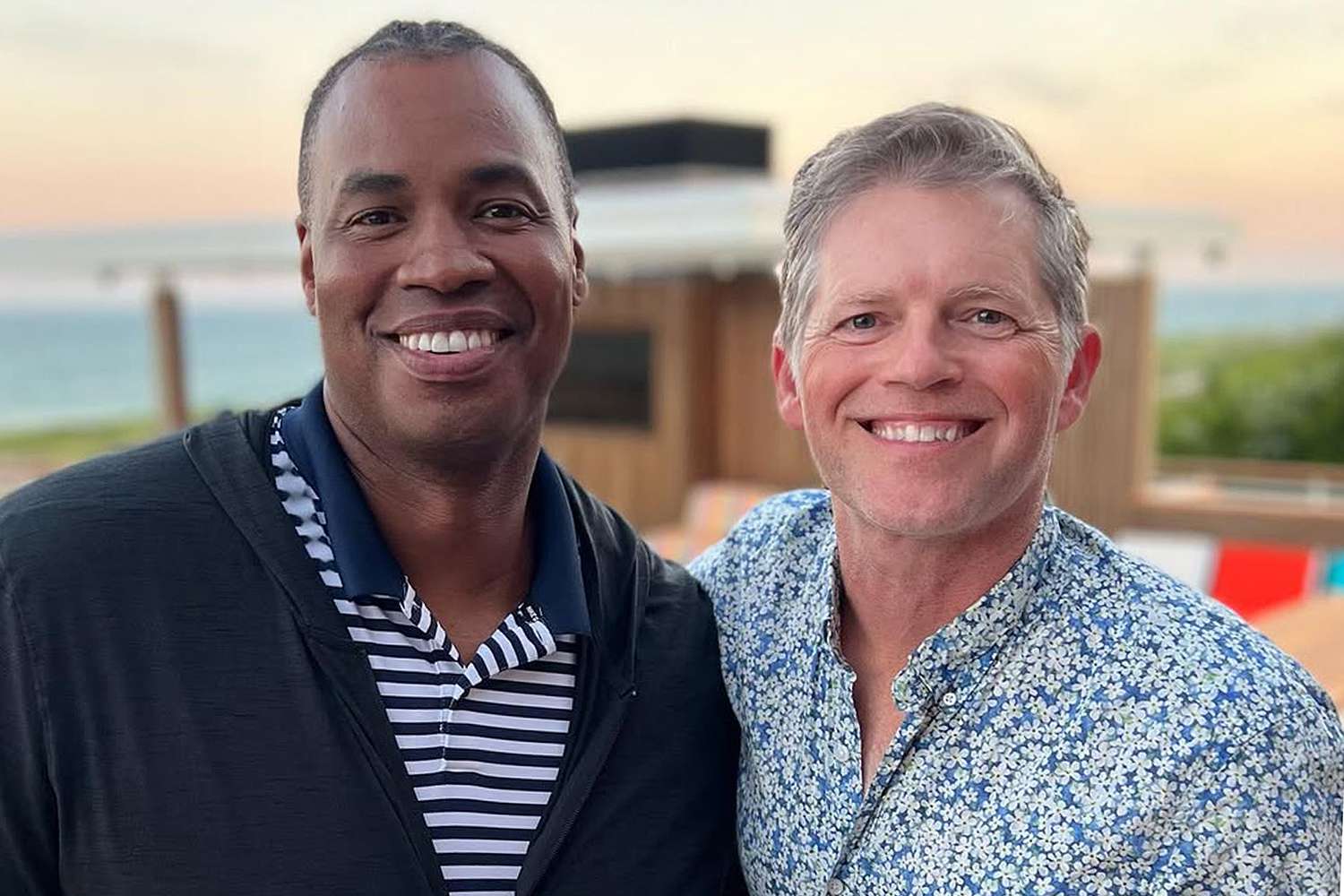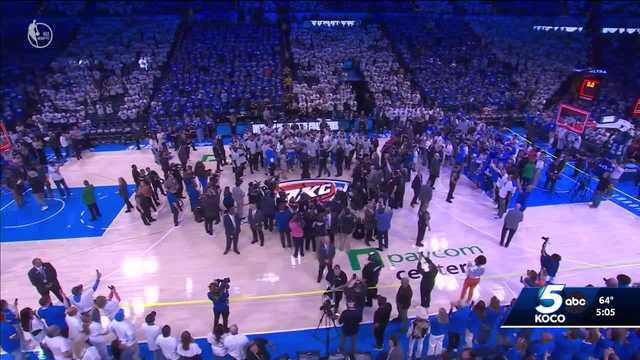
Shai Gilgeous-Alexander and Jalen Williams lead the way in Game 4 as OKC halts Minnesota to go up 3-1.
MINNEAPOLIS — Finally, a close game, some tension, a furious fourth quarter, plenty of demands placed upon the key players in this contest. And in the end, one team held a firm grip on the Western Conference Finals.
That would be Oklahoma City, because the Thunder on Monday made good on all the promises they generated from a 68-win season, bringing solid defense and the Kia NBA MVP when it truly mattered.
The series is now 3-1, with OKC just 48 minutes from a trip to the NBA Finals. Speaking of trips, the Thunder departed Minneapolis knowing they can clinch the conference crown at home on Wednesday (8:30 p.m. ET, ESPN).
This series is OKC’s to lose and Shai Gilgeous-Alexander’s to lose. And neither the top-seeded team nor the supreme player is showing signs of letting this slip away.
The Timberwolves have a tough climb ahead. They need to resolve their offensive issues and win three straight against a team that hadn’t dropped that many in a row all season.
Here are five takeaways from OKC’s sweat-inducing 128-126 victory, how the Thunder kept Minnesota from seizing control at any point, and the secret sauce they used to tame the only two Wolves who can generate big buckets.
1. Shai says, ‘Shhhhhh’
Shai Gilgeous-Alexander finished with 40 points, 10 assists and 9 rebounds in a win over the Timberwolves in Game 4 of the West Finals.
He was hounded more by the Target Center crowd than the Wolves. Which says something, because the Wolves threw everything they could against the MVP. And it still wasn’t enough.
Gilgeous-Alexander came one rebound away from a 40-point triple-double. This marked the first time he was the dominant force in this series, coming 48 hours since his weakest effort of the entire playoffs (14 points in OKC’s Game 3 wipeout).
Still, the Wolves knew this heavy response was coming. They prepared for it. And they were helpless against it. Gilgeous-Alexander worked methodically and didn’t force anything, handing out 10 assists, but he mostly made Minnesota pay whenever it gave him a crack of daylight.
He had 19 points in the second half and whenever the Thunder needed a run, Gilgeous-Alexander was a big part. Oh, and this — he went to the free throw line 14 times, making 12.
The Wolves and their crowd don’t have an issue with the frequency of free throws, only how those free throws are awarded. Touch fouls? Gilgeous-Alexander perhaps benefited from a few.
“It’s your job to go out there and play basketball and shut them up,” Gilgeous-Alexander said. “I enjoyed it, for sure. The fans are going to do whatever they can do to help their team win and not help my team win. And that’s what creates home-court advantage, a fan base, energy in the building. So I expect nothing else.
“In terms of the (free-throw merchant) label … I’ve said this before — I’ve shot more free throws in a season than I did in this season. Now that we’re on top, people care about it. I don’t care. I’ve never cared. I see it as a compliment.”
2. OKC’s defense on Edwards
What do the Timberwolves need to do to survive Game 5 and bring the Western Conference Finals back home?
The challenge was high on the priority list for OKC: What manner of defense would they use to slow down, tame, reduce — whatever description fits — Anthony Edwards and keep him from torching them?
Edwards can’t get buckets when he doesn’t have the ball or room to roam. So the Thunder gave him little space, and it was effective. Edwards took just two shots in the first half, 13 for the game, and finished with 16 points. He didn’t hit his first 3-pointer until fewer than six minutes were left in the game.
This was simply elite defense, which OKC is capable of and shows why the Thunder have the league’s best-rated defense.
This was the work of coach Mark Daigneault and his staff — as well as Lu Dort and Alex Caruso. There’s a reason the two guards played 30 and 33 minutes, respectively (the latter representing a healthy portion for a bench player). Their purpose was to hound Edwards, get help from Chet Holmgren whenever a double-team was necessary and force Edwards to surrender the ball.
“They went back to how they were playing in Games 1 and 2,” Edwards said. “I got to take shots but not selfish shots. They were shooting the gaps. I just didn’t get enough chances to shoot the ball. It was what they were doing, not what I didn’t do.”
3. OKC’s defense on Julius Randle
He’s one of the hottest players in these playoffs, and he was thrown into a cold plunge Monday. Randle had his worst production of the postseason, and the reason was simple:
He can’t dribble very well, and OKC knows it.
Every time Randle put the ball on the floor, the Thunder attacked. It rattled him, forcing him to make mistakes or surrender the ball. For 28 frustrating minutes, Randle was bamboozled by OKC’s strategy.
By halftime, he had five points … and four turnovers. From then on, he was bashful about driving to the rim or dribbling on the perimeter and finished with a game-high five turnovers.
The problem wasn’t just Randle. It also exposed one of the Wolves’ biggest weaknesses: The lack of a quality point guard. If the Wolves had such a player, then Randle wouldn’t play point-forward, which, against this defense, he’s ill-equipped to do.
For the second time in this series, Wolves coach Chris Finch found a reason not to play Randle.
“He didn’t have a great night, obviously,” said Finch. “The bench was really, really good so I rolled with them.”
Randle finished with five points on 1-for-7 shooting. For context, Rudy Gobert almost tripled that amount. And Minnesota wouldn’t beat too many teams under those circumstances.
“I don’t think I struggled or he struggled,” Edwards said. “They just had a good game plan. They were taking us off the ball.”
4. Jalen Williams to the rescue
The best player on the floor in the first half was Williams. As Edwards did in the previous game, Williams set the tone for his team with his energy and scoring ability. In doing so, he put the Wolves on their heels and on red alert.
All this did was keep OKC in control of the game and prevent the Wolves from paying too much defensive attention on Gilgeous-Alexander. And that’s the purpose of a second option.
Williams took 24 shots, scored 34 points, evidence of his efficiency. He scored 13 in the first quarter. Minnesota had no one for him.
“He was in control most of the night,” Daigneault said. “He never seemed sped up and it never seemed like they were dictating anything, and that’s what the great offensive players can do. Just a great adjustment by him.”
5. Chet meets the challenge
Blown out in Game 3, Oklahoma City shows its mental toughness with a hard-fought victory in Game 4.
OKC was up by five points with 40 seconds left, but in these playoffs, that lead was hardly safe. So many rallies and comebacks and stunning victories have made this postseason a memorable one … so the Thunder had work to do.
That’s when Holmgren issued a key rejection of Jaden McDaniels two feet from the rim with 40 seconds left. Suddenly, a potential three-point game remained at five as the seconds ticked away and turned the rest of the contest into a free-throw affair.
The moment was typical for Holmgren in Game 4. He delivered one timely play after another. Sometimes it was a hustle play, or an offensive rebound to save a possession, or a bucket, or a block.
Of all the Thunder, maybe Holmgren is growing up the fastest this postseason. Keep in mind that he’s coming off an injury-delayed regular season, and with just 14 career playoff games, doesn’t exactly bring a deep amount of experience.
None of that mattered on Monday. When the Thunder needed him, Holmgren answered. All told: 21 points, seven rebounds, three blocks.
“I think Chet changed the game for them,” Edwards said. “Easy points, putbacks, getting rebounds. I think that was the difference, from my point of view.”
* * *
Shaun Powell has covered the NBA for more than 25 years. You can e-mail him here, find his archive here and follow him on X.
The views on this page do not necessarily reflect the views of the NBA, its clubs or Warner Bros. Discovery.


